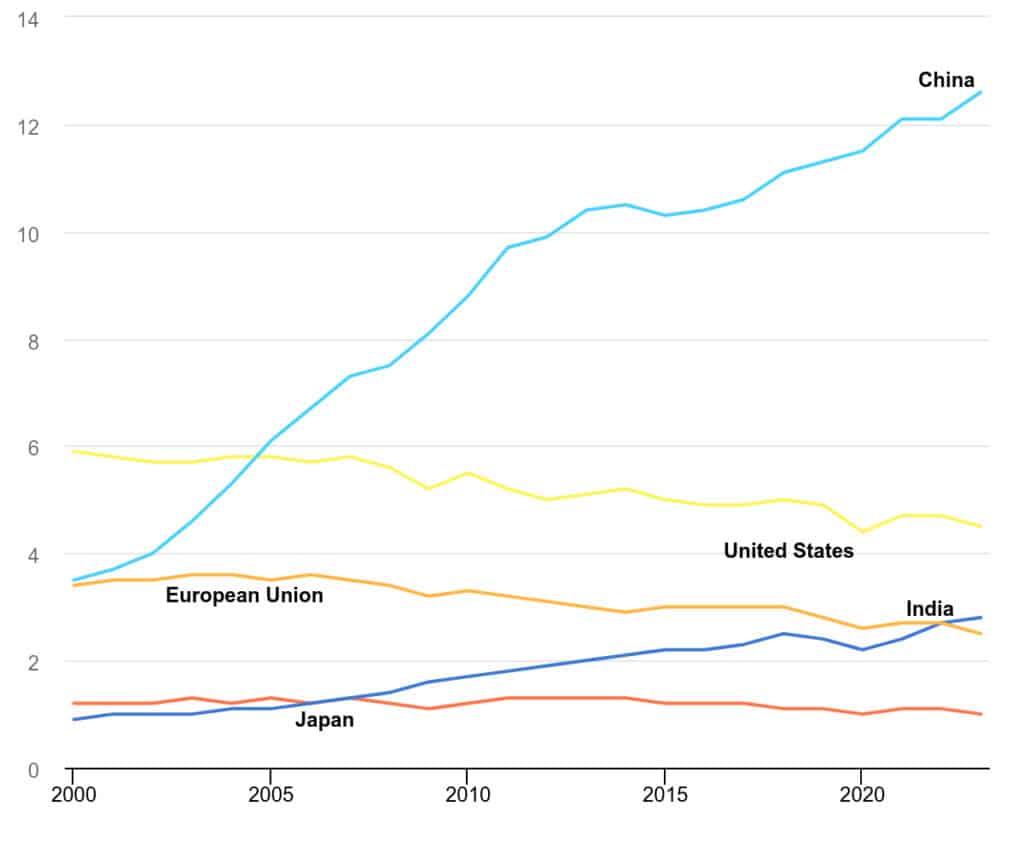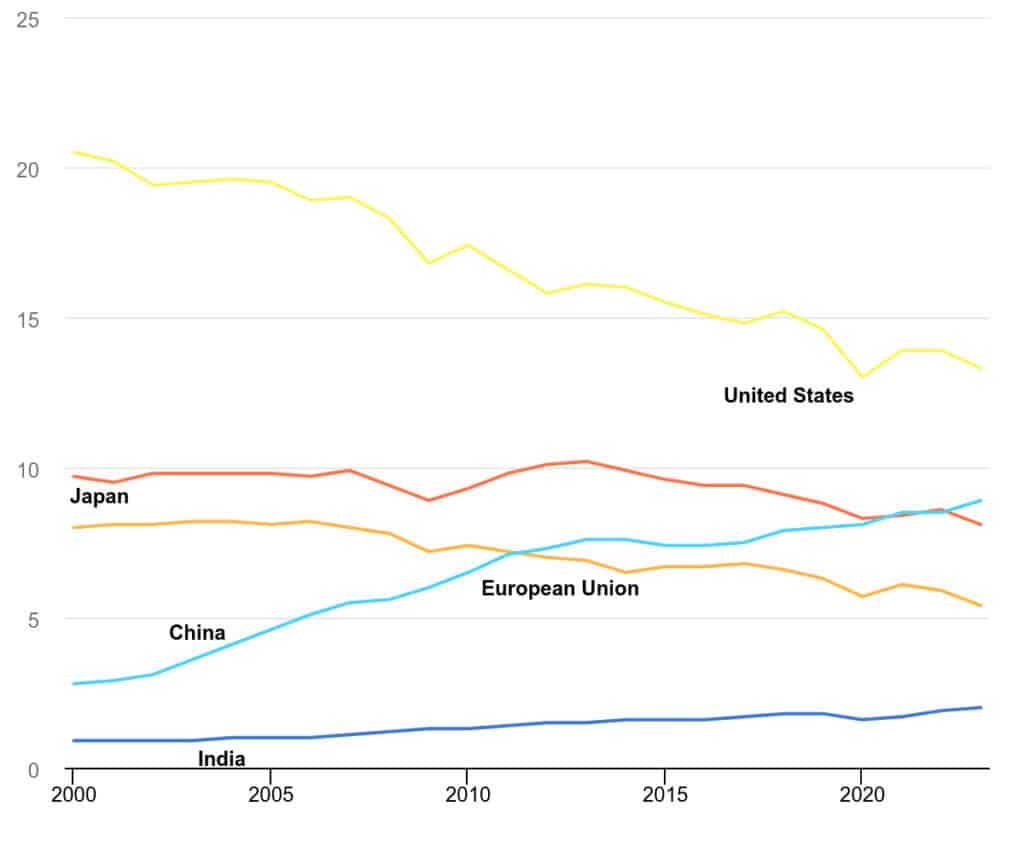Volcanoes are erupting in The Philippines, but on-fire Australia received some welcome rain. The Iran war cries have been called off and The Donald’s military powers are about to be hamstrung by the Senate. Meanwhile, his impeachment trial is starting, and we’re all on Twitter for a front-row seat.
What Could Go Right? Some Good Climate News
How much did CO2 emissions fall in advanced economies in 2023?
This is our weekly newsletter, What Could Go Right? Sign up here to receive it in your inbox every Thursday at 5am ET. You can read past issues here.
Back to the 70s
If you were to guess, by about how much did energy-related CO2 emissions fall in advanced economies between 2022 and 2023? (Energy-related doesn’t include emissions from such things as cattle, landfills and incineration plants, and certain manufacturing processes.)
- 5 percent
- 10 percent
- 2 percent
- Trick question; they didn’t fall
The correct answer is A, according to a new report from the International Energy Agency (IEA).
In 1973, when emissions from advanced economies were comparably low, the Sydney Opera House had just opened, Pink Floyd’s The Dark Side of the Moon had just come out, and the United States Supreme Court had just ruled on Roe v. Wade—the first time around.

As you can see from the graph above, emissions were also about as low in 1983 and 2020. The big difference between those periods and now, however, is that those drops corresponded to stagflation in the early 1970s, a recession in the early 1980s, and the pandemic in 2020, which as we know shut down the world economy.
In contrast, the 2023 decline occurred during a period of economic growth, and during a time in which emissions from advanced economies have been declining for years. In other words, this emissions low is not anomalous compared to the overall picture, but an expected outcome.
A good portion of this decline, two-thirds, resulted from advanced economies turning rapidly away from coal-powered electricity and toward renewables and natural gas. For the first time in history, the report says, half of electricity generation came from renewables and nuclear.
Excluding the Great Depression, the last time coal demand was this low, in the early 1900s, Las Vegas had just been founded, Albert Einstein was completing his doctoral dissertation, and Nicholas II of Russia had a revolution on his hands.

Good for advanced economies, although all the usual not moving fast enough to meet warming targets caveats apply.
Growing Slower than a Bad Haircut
How does this fit with where emissions are globally? In 2022–23, per the IEA, global emissions grew by 1.1 percent. Still growing, then, but in the last decade, much more slowly than they had been. The slowdown was due to the deployment of five clean energy technologies—solar, wind, nuclear, heat pumps, and electric cars—without which, the report says, “emissions growth would have been three times larger.”
And 40 percent of the rise was due to a hydropower shortage, the result of droughts in China, the US, and other places. “Had it not been for the unusually low hydropower output,” says the report, “global CO2 emissions from electricity generation would have declined last year, making the overall rise in energy-related emissions significantly smaller.”
Outside of advanced economies, coal is still king. Demand for it, particularly in India and China, was the biggest factor in global emissions growth. India, for the first time, now produces more total emissions than the European Union (EU), surpassed only by China and the US (although India still produces far less per capita).


I’m not sure how much the public narrative has caught up with this changing landscape. If you have time, I would love to hear from our readers whether you got the quiz question correct, especially if you chose D. Or if you have any other thoughts you want to share. Click reply to reach me.
By the Numbers
4.9M: The number of children who died before the age of 5 in 2022, the first time in history it has fallen below 5 million.
$600M: The newly announced financial commitment from the World Health Organization to end cervical cancer. Recent studies show that the HPV vaccine works so well that expanded vaccine coverage, plus screening and treatment, could eliminate the disease.
1879: The last time the United Kingdom’s greenhouse gas emissions were as low as they were in 2023, according to an analysis by Carbon Brief. The 5.7 percent decline from the year prior had largely to do with low gas demand, however.
Quick Hits
🇮🇳 India has eliminated extreme poverty, defined as living on $1.90 per day. It has also made significant headway in reducing poverty, defined as living on $3.20 per day. Simultaneously, inequality has declined by an unprecedented amount both in urban and rural areas.
🐟 Marine researchers have found about 100 new species of fish, coral, mollusks, and other organisms in the waters off the coast of New Zealand. Scientists believe that we have identified only 10 percent of all existing marine life.
💊 A new drug called Trikafta works so well to clear cystic fibrosis (CF) symptoms that those born with CF who start taking the drug in early adolescence are now projected to live into their 80s. Children born with CF used to die by the age of 5. (The Atlantic $)
🐶 A canine cancer vaccine has doubled survival rates in a trial of 300 dogs with a handful of common cancers. The vaccine may be approved by the USDA as soon as next month.
🌡️ Weather forecasts have become much more accurate, not only making our lives easier but also saving them in the event of a major storm, hurricane, heatwave, or flood. Improving early forecast systems in poorer countries is now crucial.
🧬 Researchers have developed a new generation of sensors that can detect trace amounts of fentanyl, heroin, and cocaine, even if they are cut with other substances, a potential boon in law enforcement and public health contexts.
🌼 The Florida golden aster, a “daisy-like perennial herb,” has been taken off the endangered species list.
💻 The data is in, says the Cato Institute: Remote work wasn’t just a pandemic trend. It is here to stay.
👩 Starting this month, an over-the-counter birth control pill will be available for purchase for the first time in American pharmacies as well as online.
🙅 Virginia has become the second state, after Colorado, to ban legacy admissions in public universities.
👀 What we’re watching: New legislation in Mississippi may ban devices used to convert semi-automatic rifles into fully automatic ones. They are banned under federal but not state law, so police officers cannot charge individuals found with them. The law was inspired by the death of an officer, with portions written by the National Rifle Association.
💡 Editor’s pick: From one of the poorest countries in Africa to a lower-middle-income one by 2025—Substacker Yaw Asamoah tells the story of Ethiopia’s rapid economic growth.
TPN Member Originals
(Who are our Members? Get to know them.)
- How to tackle truth decay | The Atlantic ($) | Deb Roy
- How Slow Boring plans to cover the 2024 election | Slow Boring | Matthew Yglesias
- Debbie Downer progressives aren’t helping | Slow Boring | Matthew Yglesias
- The world is a less impoverished and more equal place than you think | Faster, Please! | James Pethokoukis
- The Supreme Court reinstates Trump on Colorado’s ballot | Tangle | Isaac Saul
- Inside America’s shadow war with Iran | NYT ($) | Thomas L. Friedman
- Iraq is at a crossroads | The International Correspondent | Faisal Saeed Al Mutar
- Netanyahu is making Israel radioactive | NYT ($) | Thomas L. Friedman
- A case for guarded optimism in the Middle East | WaPo ($) | Fareed Zakaria
- Five ways to make the world a better place | The Atlantic ($) | Arthur C. Brooks
- The problem with blaming climate change for extreme weather damage | The New Atlantis | Ted Nordhaus
- 🎧 Yuval Noah Harari explains why the world isn’t fair (but could be) | GZERO | Ian Bremmer
- How men can be invaluable at the dance | Of Boys and Men | Richard V. Reeves
- The ‘rule’ against ending sentences with prepositions has always been silly | NYT ($) | John McWhorter


